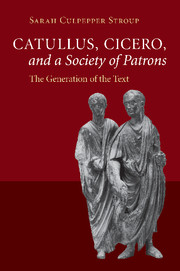Book contents
- Frontmatter
- Contents
- Preface and acknowledgments
- List of abbreviations
- Introduction
- I HOW TO WRITE ABOUT WRITING
- II THE TEXTUALIZATION OF DISPLAY
- III THE MATERIALIZATION OF THE TEXT
- Epilogue
- Appendix: What “Society of Patrons”? A prosopography of the players
- Bibliography
- Index locorum
- Index rerum et nominum
II - THE TEXTUALIZATION OF DISPLAY
INTERSECTIONS OF RHETORIC AND SOCIAL PRACTICE (1): FROM DISPLAY TO TEXT
Published online by Cambridge University Press: 04 August 2010
- Frontmatter
- Contents
- Preface and acknowledgments
- List of abbreviations
- Introduction
- I HOW TO WRITE ABOUT WRITING
- II THE TEXTUALIZATION OF DISPLAY
- III THE MATERIALIZATION OF THE TEXT
- Epilogue
- Appendix: What “Society of Patrons”? A prosopography of the players
- Bibliography
- Index locorum
- Index rerum et nominum
Summary
Ligarianam praeclare uendidisti. posthac quicquid scripsero tibi praeconium deferam. quod ad me de Varrone scribis, scis me antea orationes aut aliquid id genus solitum scribere ut Varronem nusquam possem intexere. postea autem quam haec coepi φιλολογώτερα, iam Varro mihi denuntiauerat magnam sane et grauem προσφώνησιν.
Ep. Att. 13. 12. 2–3 (45 BCE)You have done a tremendous job marketing my pro Ligario! From here on out, whatever I write – I will leave the publicity to you. As for what you write to me of Varro, you know that in the past I have written my orationes – for lack of a better word – in such a way that I could never weave Varro into the tapestry. But just as I have begun these more literary pursuits, now Varro has announced that he will dedicate to me a work of some substance!
In 45 BCE, at the end of a long and successful career as an orator and shortly before his own untimely death, Cicero wrote to Atticus for advice in the matters of textual publication, composition, and exchange. These lines, in which Cicero first tips his hat to the orality of his origins (orationes) and then praises the potential of his recent and more literary compositions (haec…φιλολογώτερα), embody the competing concerns that faced the textual communities of the late Republic.
- Type
- Chapter
- Information
- Catullus, Cicero, and a Society of PatronsThe Generation of the Text, pp. 111 - 116Publisher: Cambridge University PressPrint publication year: 2010



